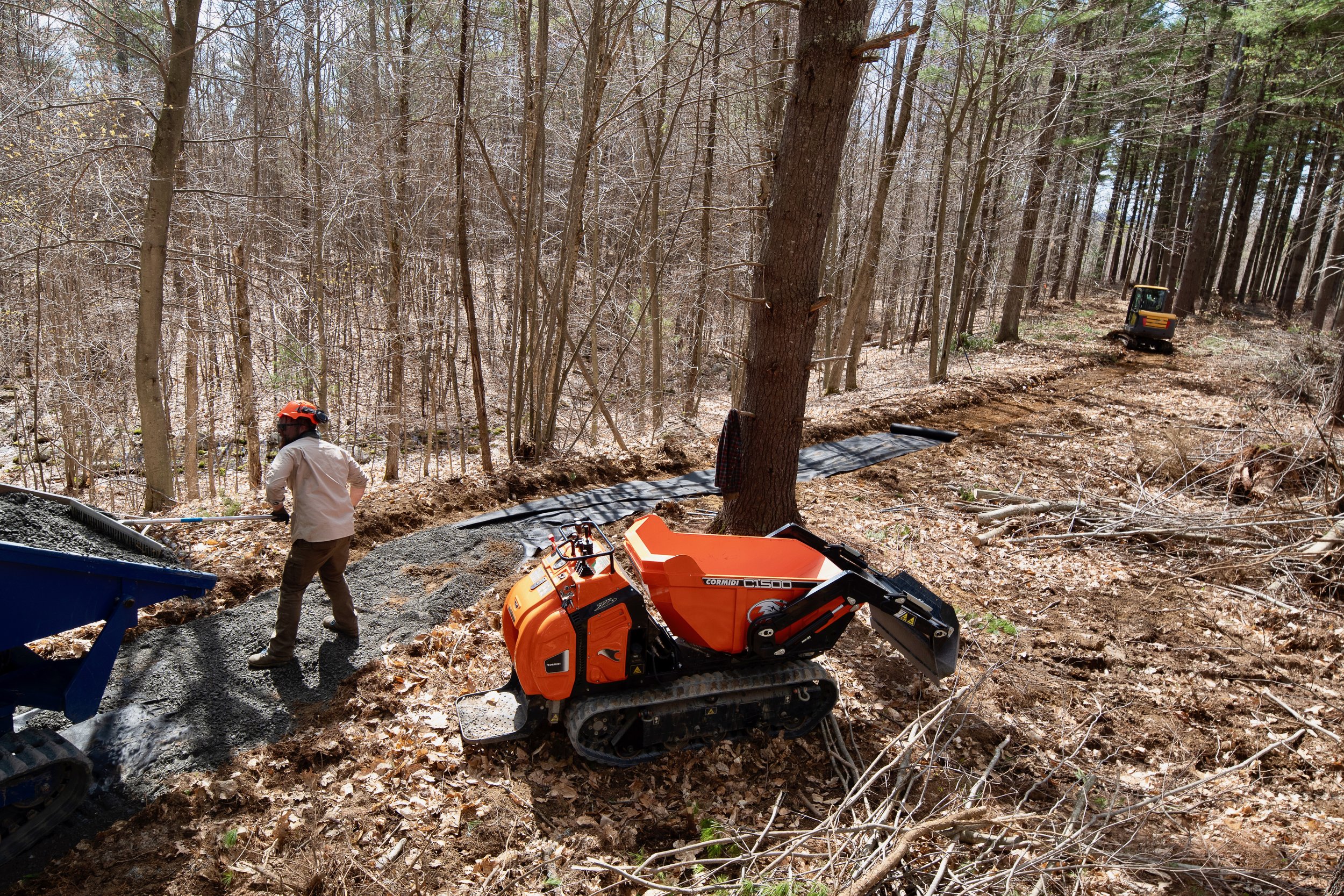The City of Augusta, the City of Hallowell, and The Kennebec Land Trust propose to build a 1.5+ mile accessible trail on Howard Hill Historical Park in Augusta and Effie Berry Conservation Area in Hallowell.
The trail will be built to United States Access Board accessibility standards to enable a wide variety of users, including those with mobility impairments, as well as families with young children, to experience the wooded hilltop of Howard Hill, its scenic viewpoints overlooking the Maine State Capitol, and the field habitat of Effie Berry Conservation Area. This area was chosen due to its proximity to a large population center and because these properties offer unique outdoor experiences.
The trail will be:
Wide—at least 6’ wide to accommodate mobility devices and two-way traffic
Smooth, hard-packed gravel that is free of obstacles and firm in most all conditions
A very gentle grade (slope) throughout
Sited carefully on the natural landscape to be aesthetically pleasing and to sustainably manage water flows and visitor traffic
Watch a video about the trail project created by KLT's 2023 interns and videographer Tim Long:
The project will be completed in two phases.
The first phase will include a ~4,800’ loop built from the future Ganneston Dr. parking lot to the Howard Hill capitol overlook and back to the parking lot. It will also likely include a ~1000’ spur to the lower Capitol vista.
The second phase will be a ~2,500’ trail connecting the phase 1 loop with Hallowell via the Effie Berry Conservation Area and a trailhead at Stevens Commons. See below map for more details.
Building this type of trail is a big endeavor and we are asking for your support!
Project Budget
The total project budget of ~$1,500,000 includes a new parking lot with funds provided by the City of Augusta, construction of over 1.5 miles of accessible trail, supporting infrastructure such as kiosks, signage, and benches, improvements and extensions to existing trails, and a fund for perpetual maintenance of the Howard Hill and Effie Berry trail system.
We hope to receive significant support from state and federal funding agencies, the business community, and individual donors and foundations. Our community fundraising goal from KLT members, businesses, foundations, and other community members is approximately $400,000.
FAQ
What is an accessible trail?
The goal of an “accessible trail” is to allow more people with mobility devices, limited mobility, vision impairments and families with young children to experience nature without significant barriers. The trail will be built to the following Architectural Barriers Act (ABA) specifications:
Firm and stable tread
Wide clear tread width (5’ +)
No tread obstacles or gaps greater than 1/2”
Cross slope no greater than 5%
Running grade/slope specifications (see image above/right)
When will this project happen?
KLT will be fundraising and planning for the Howard Hill accessible trail with the City of Augusta and the City of Hallowell through the summer of 2025. This will include applying for federal, state, and foundation grants and building support from individuals and the business community. Tentatively, the City of Augusta will build the parking lot off the end of Ganneston Drive during the summer or fall of 2025. Trail construction will hopefully begin in the spring or summer of 2026.
Why is the trail so expensive?
Gravel base is installed over geotextile fabric after the excavator establishes an initial grade. Baldwin Hill Conservation Area. Photo: OBP Trailworks LLC.
Building 1.5+ miles of accessible trail is a significant undertaking. Contractors, KLT staff, and city officials will design and build the trail to meet strict accessibility guidelines set fourth by the United States Access Board, found in the Architectural Barriers Act. Meeting these requirements and ensuring a sustainable, aesthetically pleasing trail involves extensive construction. Due to the strict grade requirements, the trail must traverse and wrap around the slopes of Howard Hill rather than following the straightest or most open line, and it must do so in a way that manages water flows sustainably.
Construction begins with the clearing of the corridor followed by the removal of stumps and the excavation of organic materials. The natural soils are leveled and shaped to retain gravel fill. Geotextile fabric, and in some places drain stone, is then laid down before a base layer of gravel is imported using specialized machinery that can navigate the narrow and winding trail. This gravel is carefully graded and compacted before being topped with a layer of fine gravel that offers little resistance to wheel chair users. In some areas, culverts and short bridges may be needed to manage water flows.
In addition to this design and construction work, the project budget include the city funds for the Augusta parking lot, the design and installation of accessible signage, kiosks, and benches, as well as other amenities around the parking area such as outhouses. It also includes maintenance funds to ensure the long term sustainability of the Howard Hill and Effie Berry trail system.
Does KLT have any other accessible trails already?
KLT has one short trail that meets federal accessibility standards on Baldwin Hill in Fayette. The trail was built as part of a Conservation Cemetery project.
How do we find other accessible trails in the area?
Maine Trail Finder has an accessible trails feature on their trail app.
Donate by Check
To donate by check, please mail your check to:
The Kennebec Land Trust
PO Box 261
Winthrop, ME 04364
Make checks payable to:
The Kennebec Land Trust
Memo: A Trail for Everyone
Recognition Levels:
Trail Blazer: $1,000–$4,999
Pine Tree Patron: $5,000–$9,999
Summit Steward: $10,000–$19,999
Vista Visionary: $20,000 and above
Donors will be recognized on a wooden kiosk at the trailhead.
Note: Any donations exceeding this campaign’s goal will be used for long-term maintenance and stewardship. The campaign includes 3% for administrative costs.
For more information or to discuss this project with KLT staff, feel free to call the office at (207) 377-2848 or email us at info@tklt.org




